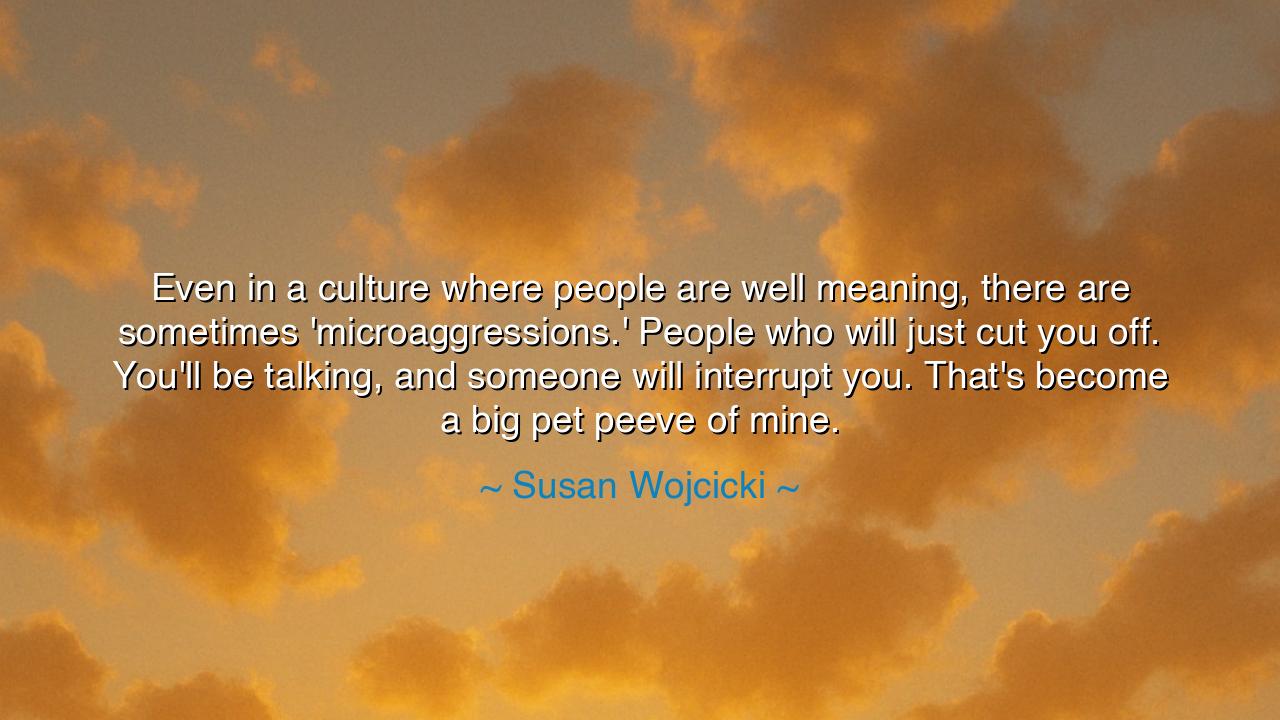
Even in a culture where people are well meaning, there are
Even in a culture where people are well meaning, there are sometimes 'microaggressions.' People who will just cut you off. You'll be talking, and someone will interrupt you. That's become a big pet peeve of mine.






In the words of Susan Wojcicki: “Even in a culture where people are well meaning, there are sometimes ‘microaggressions.’ People who will just cut you off. You'll be talking, and someone will interrupt you. That's become a big pet peeve of mine.” At first glance, this may seem like a small complaint about manners. Yet within it lies a profound truth about the dignity of speech, the sanctity of listening, and the subtle wounds that can be inflicted without malice. For to interrupt is not only to break a sentence—it is to break the bridge between souls, to silence a voice that sought to be heard.
The ancients revered speech as sacred. The Greeks called humanity the zoon logon echon—the creature of reason and language. To speak was not a mere act of noise but the sharing of thought, the unveiling of the soul. To interrupt this act was considered a violation of respect. In the councils of Athens, in the senates of Rome, in the circles of philosophers, the right to speak in full was guarded as a pillar of justice. For where one voice is cut short, truth itself may be lost.
Wojcicki speaks of microaggressions, small wounds of the spirit. They are not the great crimes of tyranny, but the thousand cuts of neglect, thoughtlessness, and disregard. To be interrupted, especially repeatedly, is to be told without words that one’s thoughts do not matter, that one’s presence is lesser. These slights, though often unintended, can erode confidence and silence voices that the world most needs to hear. The wise know that great harm often begins with small neglects, and that the health of a community depends not only on laws but on the daily courtesies of respect.
History provides us a mirror. Consider the tale of Hypatia of Alexandria, the philosopher and mathematician. In a time when women’s voices were often drowned by men, she persisted in teaching, writing, and debating. Imagine how often she was interrupted, dismissed, or cut short, yet her perseverance made her a beacon of wisdom in the ancient world. Her life reminds us that silencing voices—whether through interruption or oppression—impoverishes the whole of humanity. For every unheard thought is a lost flame, and darkness spreads where light is denied.
Thus, when Wojcicki declares that interruption has become a pet peeve, she is not speaking only for herself. She is voicing the cry of all who long to be heard in full measure. To demand the right to finish a thought is to demand respect, dignity, and recognition of one’s humanity. It is to affirm that every voice, whether humble or great, carries meaning and deserves the space to unfold. This is not vanity, but justice.
The lesson is clear: listen deeply, and let others finish their words. Do not be so eager to speak that you trample upon another’s thought. Silence, when held with patience, is not weakness but strength, for it shows reverence for the sacred gift of dialogue. To allow another to speak is to open the gates of understanding, to create a world where every voice contributes to the harmony of the whole.
In practice, cultivate the art of listening. When someone speaks, give them your full attention. Resist the impulse to interject, to hurry, to claim the moment. Count in your mind before replying. Notice those who are often silenced and invite them to continue. In this way, you will not only avoid microaggressions, but will sow the seeds of trust and respect. For a society grows strong not when the loudest voice prevails, but when every voice is honored.
Therefore, let Wojcicki’s words be a reminder: interruptions may seem small, but they reveal the state of our regard for one another. If we wish to build cultures of justice and wisdom, we must begin with the smallest acts of courtesy. Let each of us be guardians of dialogue, protectors of speech, and cultivators of respect. For in listening, we honor the dignity of others, and in honoring them, we rise together.






AAdministratorAdministrator
Welcome, honored guests. Please leave a comment, we will respond soon